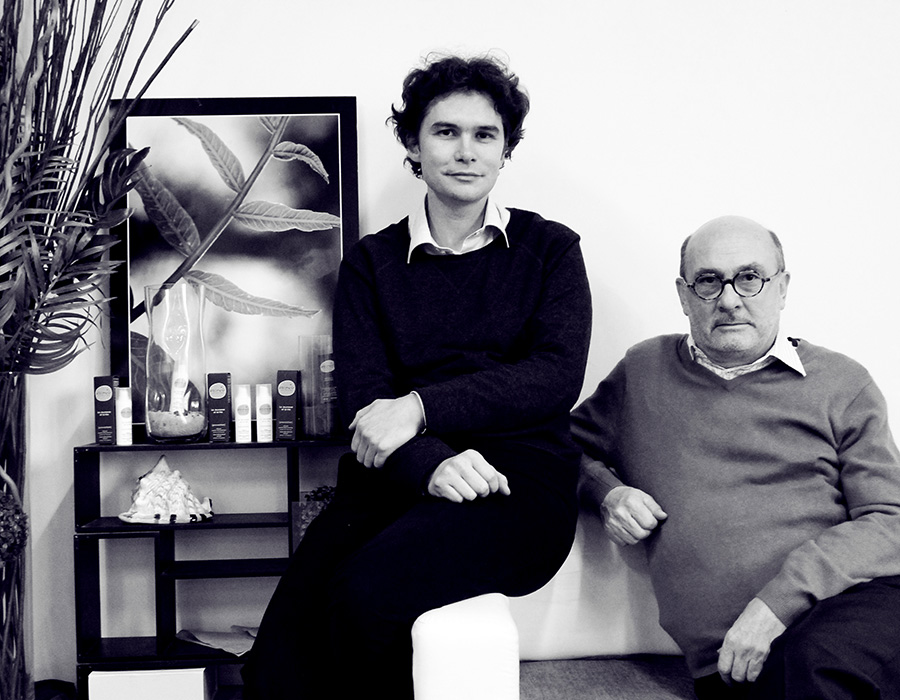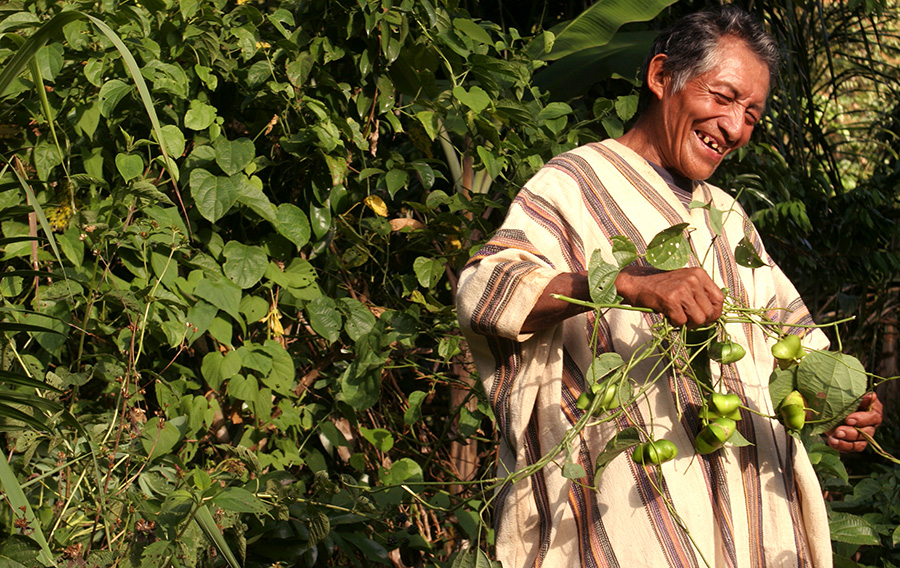Daniel Joutard (above, left) couldn’t resist the call of the Amazon. He’s now built an innovation cosmetics brand in France, based on the magical properties of plants.
“My company is a combination of magic and science,” says Daniel Joutard, founder of French cosmetics company Aïny Savoirs des Peuples. A business school grounding and consultancy work for large corporations around Europe had always kept Joutard very rational. He knew the world was ruled by reason and science and had always been skeptical of “magical” claims by far flung tribes that plants could heal you. Yet he couldn’t seem to stay away from the remote communities of Ecuador and the Andes region of Latin America, with whom he found a strange attraction.
It started when Joutard became fascinated with native Latin American culture. He’d studied for six months in Mexico and became more interested, so decided to go and work fo three months in Ecuador. “I was so fascinated by the way native people see the world,” he remembers of his first encounters. “When you work with indigenous people you realise they see the world in a very different way, for them everything is magic, everything has a soul: the trees, human beings, stones and rivers. This was very different from my life in France, where we believe firmly in science.
When you see the world in a magical way it becomes more poetical and you have to respect it so much more.” Joutard found himself being drawn in deeper each time he returned and observed how intuitive the locals were when they needed to heal their sick with “magic” plants. “I didn’t believe in it at all, says Joutard, “but when I was sick in the middle of the Amazon, with no medics around, I only had the local communities to rely on, and they cured me. I might not have been very open minded to their medicine, but it worked. They call it ‘magic’ and we call it ‘science’, but it had the same end result and that is how my business began.”

Back in France between stints as a microcredit manager in Peru, Joutard decided he wanted to work with sacred plants. He had no idea where to start, but had a breakthrough in 2006 when he contacted Jean Le Joliff, former R&D director at Chanel, who agreed to 30 minutes of his time. The meeting lasted all afternoon with Le Joliff ending up offering his services for free.
They began their research, hired a chemical engineer and created a lab. It took three years to transform the seeds they had sourced from Peru into active cosmetic extracts, and then a while longer to turn it into a unique cream. In 2008 at Beyond Beauty, the most important cosmetics fair in France, they were awarded the jury’s special award and the following year were awarded for best natural and organic brand. By September 2009 the products were on sale.
As with all luxury products that come with a high price tag, the elements of time and highly-skilled craftsmanship are the most coveted ingredients. “Time intensive, the hand of man, limited quantity and quality mean luxury,” says Joutard. The company starts with barks and leaves that are turned into creams in a process that takes over three years. They produce two products a year, nothing else. An Ecuadorian healer that he met years ago has played a starring role in the company.
“She opened the door to understanding what I could not understand before,” says Joutard. “She taught me that listening comes before making any statement.” She has been present at all key moments of Aïny and even gave them the company name. Aïny can have several meanings, but mainly “I help you today, you help me tommorow,” a mainstay of the native communities of the Andes. Luckily, for the companies expansionist views, the name also means “I love you” in Chinese. He was initially told, “You must be mad to start a new cosmetics company in France.”
It’s the most competitive market in the world, with giant local players and foreign players trying to push in to gain the historic legitimacy the country has to offer around cosmetics. Joutard was also warned that he’d need millions of euros to launch a new brand, which he didn’t have. A little known fact in France is the support to be found from national agencies. The support he found for his innovation was decisive during their three years of research and development.
Aïny Savoirs des Peuples are now at a point where they sell their knowledge to other corporations, who are too busy to invest the same time that Joutard has. Mainstream commercial cosmetics companies are usually in a hurry to get their product to market and three years of production is out of the question. “It’s slow work when you work with indigenous people,” explains Joutard. “You mustn’t be in a hurry because they aren’t. If you are in a hurry they don’t work.”
And unlike the world’s largets cosmetics companies Joutard does not believe in putting any patents on the plants they have “discovered.” “We are betting that by creating trustful relationship with communities we will know about something that gives us a strategic advantage, before other companies catch on,” says Joutard.
He also publically publishes certain parts of their innovative research on plants, effectively blocking other cosmetic companies from claiming the ideas are theirs. This has the affect of keeping everybody at the same level, with Joutard’s advantage being that he is quicker at getting the world to know about the next interesting plant. “Ours is a different way of thinking,” says Jotard. “Our industry is based on patents – everybody tries to put patents on plants to create a monoploy, but we do the opposite.” To highlight the scale of the problem: France even has a national commission that fights against biopiracy.
A three year battle recently saw the commission force some French cosmetics companies to give up patents on indigenous plants in Peru. There are many examples of large companies patenting indigenous plants and foods around the world. Much of the pharmaceutical industry depends on a window of opportunity too, protected by patents for 11 years before it becomes public property.
Sometimes the game can get dirty. In 2012 Joutard was handed down four legal orders from the government, having been denounced by a competitor wanting to eliminate them. “Other cosmetic companies don’t like us to say patents are not fair because all their business is based on patents,” says Joutard. “It’s part of our new role as an alternative type of cosmetics company to innovate in terms of science and around social issues too. Perhaps we can try and identify the future of our industry too, which we’re hoping will look like what we’re building now.”
Aïny Savoirs des Peuplesbroke even in 2013 and are finally seeing some cash come in. They have developed a fair trade system with the communities that originally helped them get started, as a way of giving back. “The value of our products is not the plants themselves, says Joutard. “Its knowledge. So we give back 4 percent of our profits to the native organisations that are elected by the communities we work in. They then use the money for the good of their community.”
He has tried to foster entrepreneurship among the native people by treaching them how to create their own cosmetics but it has been tough going. “Its difficult to turn indigenous people into industrial people and entrepeneurs,” he says. This brings up the much-debated dilemna around globalization: many communities have survived just fine without the developed world’s intervention, yet the developing world is also desperate for knowledge and industry that will allow them to enjoy the same benefits of the developed world.
Is the 39 year-old Joutard worried about the future? If he is, his boyish face is certainly not showing it. “I use my own products on my face and it certainly helps,” he says.




































